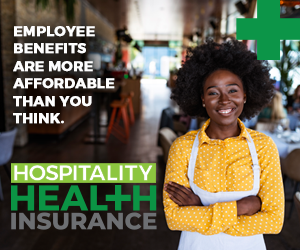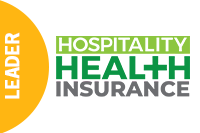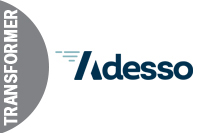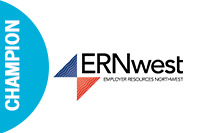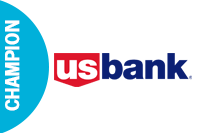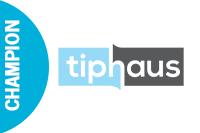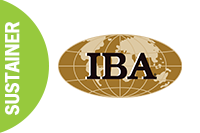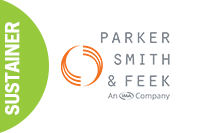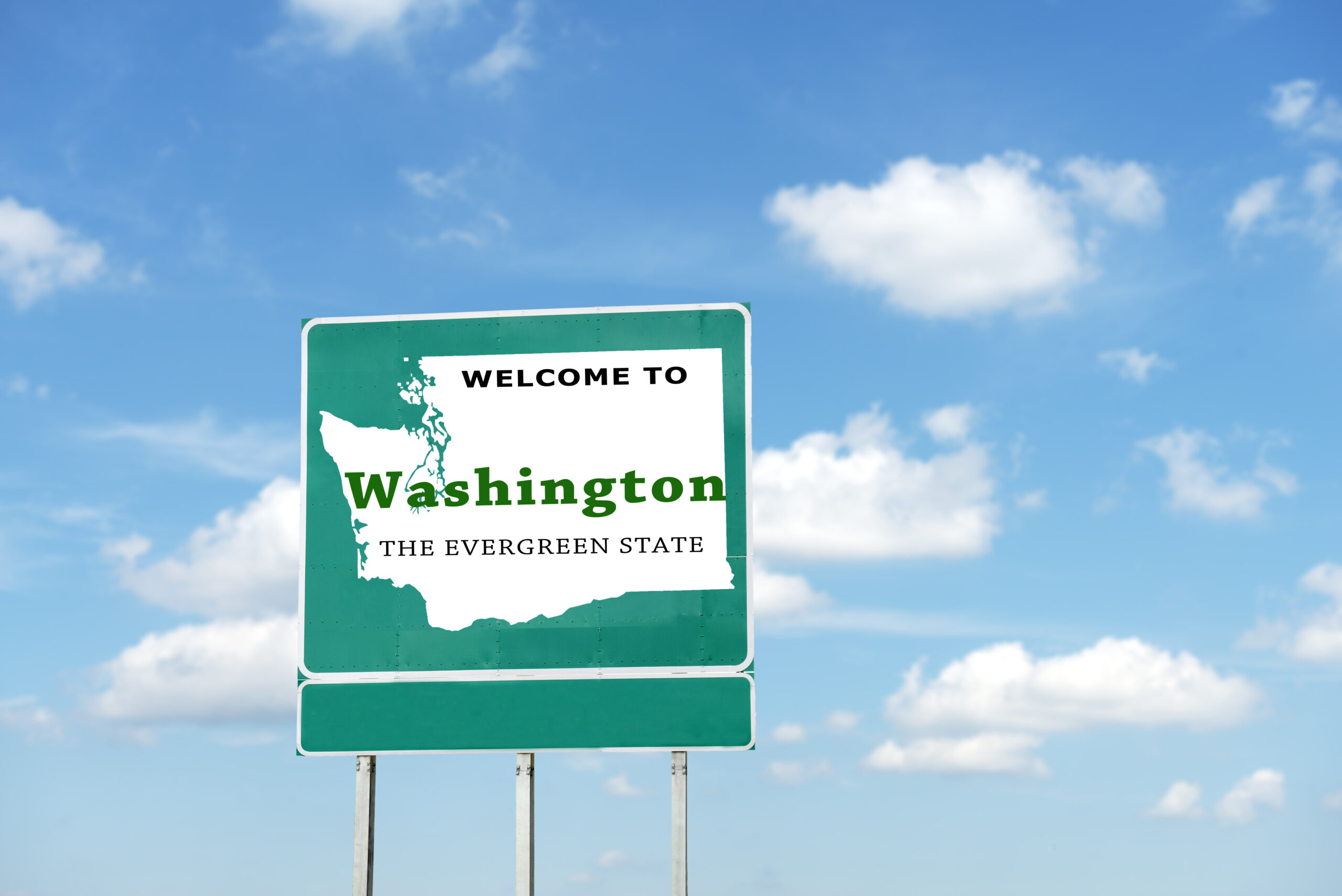
Welcome to Going Green – a collection of pages designed to assist Washington state businesses in being compliant with sustainable initiatives.
Within these pages you will find different resources to help you meet mandatory requirements as well as voluntary options for businesses seeking to integrate environmentally friendly operations.
These resources range from information on the Clean Buildings Act to guidance on how to remain in compliance with bans on plastic bags, single-use service ware and single-use personal beauty products. Additionally, you can find information about our Clean Buildings Concierge program and resources on where you can find different utility rebates to save money through adopting green practices and equipment.
By exploring the Going Green collection, you will gain access to a wealth of resources and information designed to assist your business in meeting required green regulations.
3 TAKEAWAYS YOU NEED TO KNOW
- Commercial buildings larger than 50,000 square feet (SF) are required to meet mandatory clean building performance standards. Compliance deadlines are phased in over a few years starting with June 1, 2026 for buildings more than 220,000 SF.
- Building owners cannot ignore these requirements as compliance delays can be costly. Non-compliance penalties can start at $5,000 plus $1 per gross square foot for every year of non-compliance.
- The state has budgeted $75 million to offer Early Adopter Incentives to help with the costs of achieving compliance.
CLIMATE POLICY IN WASHINGTON STATE
Several years ago, the Washington State Legislature adopted goals for reducing greenhouse gas emissions to reduce the impacts of climate change. The state recently updated these goals to put our state on a path toward net zero emissions by 2050.
Residential and commercial buildings account for nearly 30% of the greenhouse gas emissions in our state, according to the Department of Commerce. Therefore, the Legislature has approved two significant bills that mandate certain energy efficiency standards for large buildings.
Lawmakers created two bills for the new Clean Buildings Performance Standards — House Bill 1257 (2019) and Senate Bill 5277 (2022) — to make sure large buildings in our state meet certain energy efficiency standards.
CLEAN BUILDINGS ACT OVERVIEW
The Clean Buildings Act is designed to reduce energy costs, fossil fuel consumption, and greenhouse gas emissions from commercial and multifamily buildings. The legislation requires building owners to reduce their energy usage to meet or exceed prescribed Energy Usage Intensity (EUI) targets based on the building’s usage type.
Commercial buildings larger than 50,000 SF of gross floor area are considered “Tier 1” buildings and will be subject to new clean building performance standards.
Compliance deadlines for Tier 1 buildings:
June 1, 2026 – More than 220,000 square feet of gross floor area
June 1, 2027 – 90,001-220,000 square feet of gross floor area
June 1, 2028 – 50,001-90,000 square feet of gross floor area
“Tier 2” buildings are those with a gross floor area square footage of 20,000-50,000. Unlike Tier 1 buildings, Tier 2 buildings are not subject to the clean building performance standards yet. Performance standard requirements for Tier 2 buildings won’t take effect until July 2031.
However, Tier 2 building owners will be subject to mandatory reporting on benchmarking, Energy Management Plans, and Operations & Maintenance programs starting June 1, 2027. As part of the Clean Buildings Concierge Program, MacDonald-Miller can help members comply with this mandatory step. The rules for Tier 2 buildings will be finalized by the end of 2023. The Department of Commerce will begin outreach to Tier 2 building owners and launch the Tier 2 incentive program in July 2025.
If you have a Tier 2 building, you do not need to take any action right away. Your reporting requirements are a few years away from taking effect.
NEXT STEPS
Do not delay! If you are subject to the Clean Buildings Act, you need to start thinking about your pathway to compliance now.
RENTERS
**If you rent or lease in a Tier 1 building, please forward this notice to your landlord right away and encourage them to connect with our Clean Buildings Concierge Program. Landlords and property managers, especially if they are based in another state or country, may not be familiar with Washington’s Clean Building Act. The sooner they are informed and engaged on these important requirements, the better.
ADDITIONAL RESOURCES
FAQ: Clean Buildings Performance Standard (Dept. of Commerce)
Clean Buildings Act expansion fact sheet (Dept. of Commerce)
Avoid expanded polystyrene
Summary:
- On June 1, 2024, several food service products made of expanded polystyrene (EPS) will be banned for sale and distribution in Washington.
- This ban applies to any person, firm, association, partnership, corporation, government entity, organization or joint venture that sells or distributes the EPS products covered by this ban.
- This law bans the sale and distribution of EPS materials, even if businesses or entities have previously purchased stocks. Entities that currently distribute and sell EPS should transition to a compliant material before or by the effective date of this ban.
On June 1, 2024, several food service products made of expanded polystyrene will be banned for sale and distribution in Washington
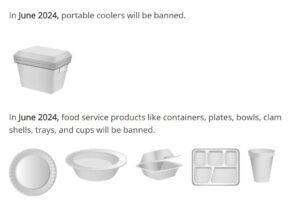
Expanded polystyrene (EPS), often mistakenly called Styrofoam™, is a type of foamed plastic used in takeout food containers and packing peanuts. While expanded polystyrene can be recycled, it is expensive and not accepted in most curbside recycling programs.
In Washington, foam fragments – including EPS – are two of the top ten items collected during beach cleanups conducted by Surfrider Foundation volunteers.
On June 1, 2024, expanded polystyrene food service products such as cups, plates, to-go clamshells, trays, food containers, and single-use coolers will be banned.
Exempt items:
- Block EPS packaging material
- Trays and packaging for raw, uncooked, or butchered meat, fish, poultry, or seafood, vegetables, fruit
- Egg cartons
- EPS containers for drugs, medical devices, and biological materials or shipping perishable commodities from a wholesale or retail establishment
The Department of Ecology will respond to non-compliant businesses, institutions, manufacturers and distributors with education, resources and technical assistance. They will start by providing assistance in gaining compliance whenever possible.
For more information and a list of alternative products, visit the expanded polystyrene ban webpage or email . Be sure to purchase alternatives that are PFAS-free.
Also, look into our newest allied member- Green Ripple Inc. This company offers innovative, 100% eco-friendly paper products, ranging from food industry essentials to household items, all derived from meticulously selected bamboo fiber. Post-disposal, Nature Bamboo’s products decompose within 3 to 12 months.
QUICK SUMMARY
- Businesses can no longer automatically include some single-use items in customer orders.
- Customers will have to verbally confirm that they want single-use items or they must select items from self-service bins.
- Certain single-use items may still be included in customer orders.
ADDITIONAL DETAILS
Beginning Jan. 1, 2022, businesses can no longer automatically include some single-use items in customer orders. Customers will have to verbally confirm that they want single-use items, or they must select items from self-service bins instead of having them automatically included with a food order.
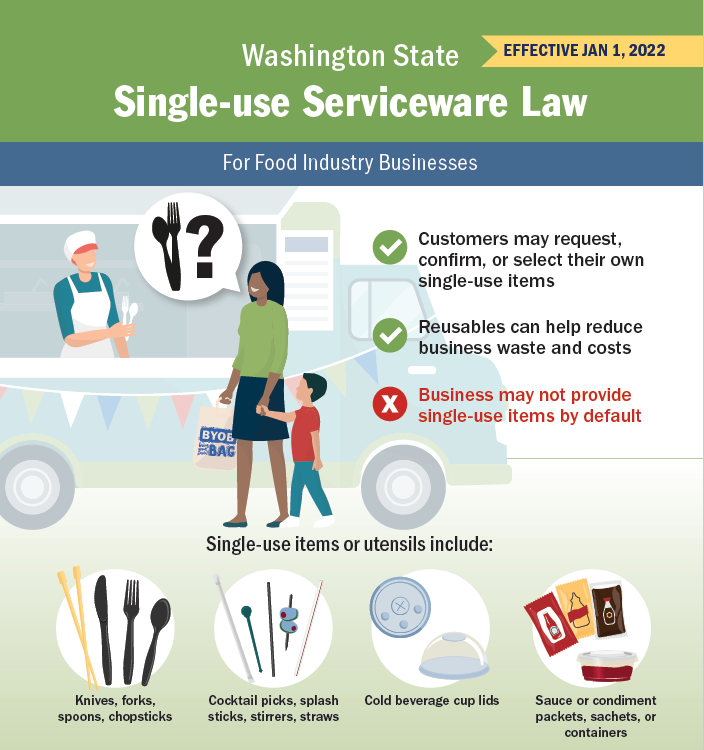
Affected items include:
- Utensils (knives, forks, spoons, cocktail picks, chopsticks, splash sticks, and stirrers)
- Straws
- Condiment packages
- Cup lids for cold beverages (Cold beverage lids may be provided by default at drive-thru.)
Items that are still OK to include with a customer’s order without verbal confirmation include:
- Plates, bowls, cups, and other products used to contain food or beverages
- Lids for hot beverages
- Wrappers for takeout food items
- Items provided by medical facilities
You can read more on the Washington State Department of Ecology website here and read the law here.
Quick summary
- On Oct. 1, 2021, single-use plastic carryout bags in all retail, restaurant and takeout establishments were prohibited.
- Food establishments must include an $0.08 charge on any thicker (2.25 mil) reusable plastic bag or a larger paper bag (1/8 barrel bag) and keep all revenues generated from the charge.
- Certain single-use bags may still be used.
- Some customers are exempt from paying bag charges.
Webinar: What you need to know about the single-use plastic bag ban
Featuring Shannon Jones, material management coordinator for Western Washington at the Department of Ecology, and Samantha Louderback, state government affairs senior manager at the Washington Hospitality Association.
Click here for a copy of the PowerPoint presentation.
On Oct. 1, 2021, single-use plastic carryout bags in all retail, restaurant and takeout establishments were prohibited.
BAG BAN DETAILS
There are some exemptions for food establishments to use single-use bags that do not have handles and smaller paper bags to prevent cross-contamination with ready-to-eat foods:
- Bags that contain or wrap items where dampness or sanitation might be a problem, including but not limited to frozen foods, meat, fish, flowers, potted plants are exempt.
- Bags that contain unwrapped prepared foods or bakery goods are exempt.
- Bags that protect a purchased item from damaging or contaminating other purchased items are exempt.
MANDATORY BAG CHARGES
Food establishments must include an $0.08 charge on any thicker (2.25 mil) plastic bag or a larger paper bag (1/8 barrel bag).
- The $0.08 charge is per bag and mandatory.
- This charge must be listed as a separate line item on receipts provided to customers.
- Businesses must keep all revenues generated from the charge.
- The charge is considered a taxable retail sale that must be reported to the Department of Revenue. However, these charges can be deducted from B&O taxes.
- Note: Only the eight-cent per bag charge may be deducted from income for the purposes of calculating B&O tax. For example, if a member opted to charge a total of 16 cents per bag, there should be two separately stated charges: an eight-cent pass-through charge and a separate eight-cent charge that’s being charged at the retailer’s discretion.
- Additional tax information from the Department of Revenue can be found here.
THIRD-PARTY DELIVERY SERVICES
How does the .08 per bag charge work with orders fulfilled through third-party delivery services?
Unfortunately, this is a gray area in the implementation of the new law and we don’t have a clear answer just yet. The government affairs team has raised this issue with the Department of Ecology. Restaurants are ultimately responsible for the bag charge according to DOE. We are working on potential solutions to this issue with the third-party delivery companies and will inform members of any new developments that emerge from these discussions in the coming weeks. In the meantime, we recommend association members reach out to their third-party delivery representative on this topic.
LOCAL BAG BANS
This statewide ban supersedes all local ordinances, except in those jurisdictions where the implemented fee is higher than $.08. In those cases, businesses will need to charge the higher fee for the thicker plastic and bigger paper bags.
For more information on additional bag regulations counties or cities may have, visit the Local Ordinances page.
EXEMPTIONS
Businesses must exempt customers using the following programs from bag charges:
- Supplemental Nutrition Assistance Program (SNAP)
- Women, Infants, & Children (WIC)
- Temporary Assistance for Needy Families (TANF)
- State Food Assistance Program (FAP)
WHAT’S NEXT?
The Department of Ecology (DOE) is the enforcing agency and repeat violations may result in fines of up to $250.
If you have questions, please contact your Government Affairs team at governmentaffairs@wahospitality.org.
FREQUENTLY ASKED QUESTIONS (FAQ)
The following questions and answers were shared with us by DOE. The answers below were provided to the association by DOE in an effort to increase clarity around the new bag ban.
A business collects used bags from customers and supply them for reuse. Is this still allowed under the new law?
Technically no- you cannot provide the single-use plastic bags or bags not meeting the new requirements even if they are previously used and deposited.
Can businesses charge more than 8 cents per bag?
Since any charge in excess of 8 cents is not part of the statutorily defined pass-through charge, it cannot be deducted from that taxpayer’s income for the purposes of calculating B&O tax. RCW 70A.530.020(2)(c) requires that retail establishments show all pass-through charges on a receipt, as well.
As an example, if a retailer opted to charge a total of 16 cents per bag, there should be two separately stated charges: an eight-cent pass-through charge per Ch. 70A.530 RCW, and a separate eight-cent charge that’s being charged at the retailers discretion.
Can businesses supply a smaller paper bag at no cost?
Bags smaller than the large barrel paper bags (882 cubic inches or larger) do not require an 8 cent charge. However, they must still meet the 40% post-consumer recycled content minimum, 40% wheat straw, or a combination of the two that totals at least 40%. They must be labeled on the exterior of the bag with this percentage.
What kind of outreach resources are available for informing staff and the public of the new requirements?
The Ecology Bag Ban Website contains a link to download our Bag Ban Outreach Toolkit. This toolkit contains detailed flyers to educate businesses and their staff on all the details of the new law, point of sale signs for communicating the requirements to customers, and Bring Your Own Bag (BYOB) signage to encourage customers to bring their own reusable bags. The toolkit is available in 17 different languages and is formatted for accessibility. It can be downloaded in PDF or InDesign file formats to allow for branding and customization. Businesses are encouraged to utilize and print these materials as much as they are able
Will any of the new requirements change or increase over time?
Beginning Jan. 1, 2026, the thickness requirements for the reusable plastic film bags increases from 2.25 mil to 4 mil and the required charge for these bags increases from 8 cents to 12 cents (paper bags continue to be available for 8 cents).
Are food benefits customers (SNAP, WIC, TANF, etc.) exempt from the charge?
Yes. Food benefits customers are exempt from the charge regardless of the method of payment used. They need only show proof of their food benefits status (showing the card itself or another formal document) and can receive this exemption at all types of businesses (restaurants, retail, etc.).
ADDITIONAL INFORMATION
Department of Ecology: Information & FAQs
ESSB 5323: Bill text
ESSB 5323: Final bill report
DEPARTMENT OF ECOLOGY DOWNLOADABLE PDFS
Restaurant flyer
Retail flyer
Point of sale sign
BYOB posters
Bag ban toolkit (multiple languages)
During the 2023 legislative session, lawmakers approved House Bill 1085, which establishes a ban on single use beauty products that are wrapped in plastic like shampoo, conditioner, body wash, soap and hand sanitizer in lodging establishment guest rooms. The government affairs team worked to push the implementation date out so small businesses can plan and budget for these changes, as well as advocated for strong state-wide standard language.
Starting on Jan. 1, 2027, lodging establishments with 50 or more rooms will no longer be able to offer single-use bottles that are six ounces or smaller, or bars of soap wrapped in plastic wrap. All lodging establishments will be required to comply with the ban starting Jan. 1, 2028.
In addition, local governments will not be able to pass, enforce, or enact any policy pertaining to these products after July 23, 2023.
If you haven’t done so already, lodging operators should create a plan to phase out these single use plastic products.
Rebates and Incentives
This list, while comprehensive, may be incomplete. Please check with your local utility company to inquire about available rebate programs. Many equipment dealers can offer a rebate at the time of sale so you don’t have to wait for a refund check.





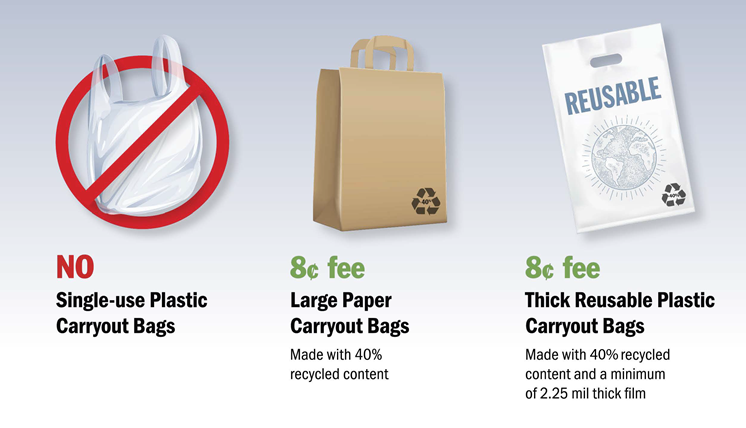
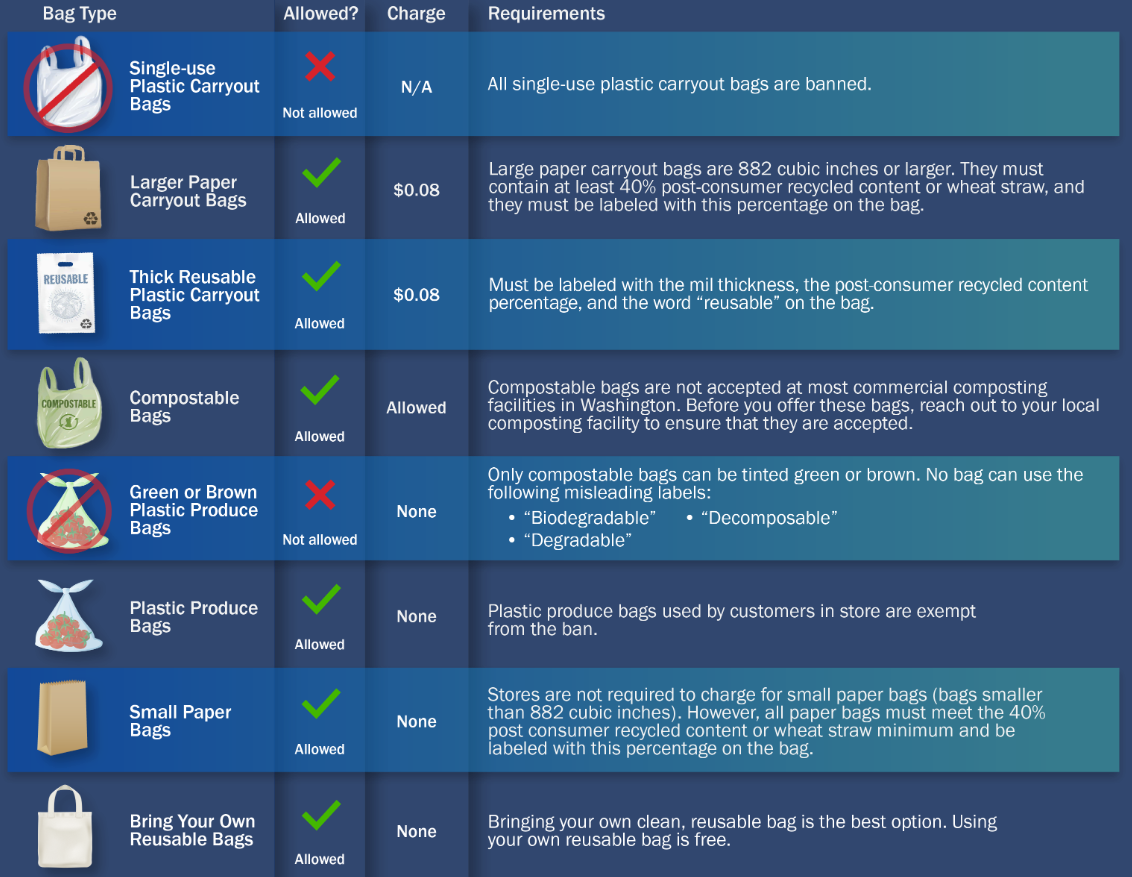




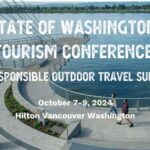
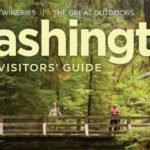

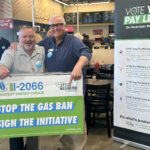
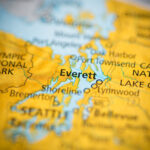
![Webinar replay! [Ask a Lawyer] Best hiring practices](https://wahospitality.org/wp-content/uploads/2024/05/CatherineHiring-webinar-150x150.png)

